|
|
|
Sort Order |
|
|
|
Items / Page
|
|
|
|
|
|
|
| Srl | Item |
| 1 |
ID:
131984
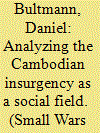

|
|
|
|
|
| Publication |
2014.
|
| Summary/Abstract |
This article investigates power practices in the Cambodian insurgency after 1979 as being part of a social field. There are various types of power practice being exercised by commanders aiming at making soldiers disciplined inside the insurgency. The hypothesis explaining these variations being proposed here is that the type of power being exercised depends on the habitus of the respective commander. Power practices are shaped by the incorporated classificatory discourse of commanders on good soldierhood and leadership. Thereby, armed groups can be analyzed as a social field in which practices are always relational and part of symbolic struggles between different commanders.
|
|
|
|
|
|
|
|
|
|
|
|
|
|
|
|
| 2 |
ID:
125040


|
|
|
|
|
| Publication |
2013.
|
| Summary/Abstract |
Despite its relative absence from much of the literature on politics in the Pacific region, religiosity is an assumed and often unchallenged component of political life. Drawing from more than 100 in-depth biographical interviews with politicians, around 40 published life histories and other publicly available material, this article uses Pierre Bourdieu's concept of 'habitus' to explore how politicians see the role of faith and religious association contributing to their public profile, election campaigning, representative and legislative functions, and 'inner' life. It advances two arguments: firstly, that ideal analytic distinctions like state, society and religion become problematic in the Pacific Islands where political leaders tend to occupy multiple roles and assume overlapping identities; and, secondly, that despite the overwhelming religiosity seemingly apparent in public rhetoric, secularization is an effervescent narrative across the region with politicians vocal protagonists on all sides of this debate.
|
|
|
|
|
|
|
|
|
|
|
|
|
|
|
|
| 3 |
ID:
106543
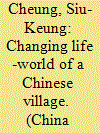

|
|
|
|
|
| Publication |
2011.
|
| Summary/Abstract |
Research into traditional Chinese society engages Chinese villages as a legitimate field for investigation. By looking into the life-world of Da Shu, a village in the New Territories of Hong Kong SAR, this article challenges a research approach that views the Chinese village as a temporal other to the contemporary world. This article demonstrates how the life-world of a Chinese village interplays with the changing historical context. The study examines the economic life that revolves around land and the overall community practices at different times. The study suggests that the life-world of this Chinese village is a historical congeries that involves varying interplays of people with varying dominant rules of time. The subjectivity of people on the ground is always imbued with remarkable historical voices and practices.
|
|
|
|
|
|
|
|
|
|
|
|
|
|
|
|
| 4 |
ID:
185329
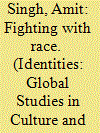

|
|
|
|
|
| Summary/Abstract |
Drawing upon ethnographic fieldwork conducted at an East London Kickboxing/Muay Thai gym, this paper explores how fighters at Origins Combat Gym seek to reject race as a discursive category in favour of constructing each other as the same, bonded by years of intimately training alongside one another. Drawing upon Bourdieu, I conceptualise a racial habitus to argue that such processes are constrained; my field-site is not a racial utopia, even if it does allow for new possibilities. Nonetheless, my interlocutors’ attempts to reject the logic of ethnic absolutism through forging complex localised solidarities offers hope in anti-immigrant times.
|
|
|
|
|
|
|
|
|
|
|
|
|
|
|
|
| 5 |
ID:
143647
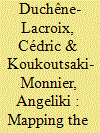

|
|
|
|
|
| Summary/Abstract |
In traditional migration theory, social self-identification is usually linked with the process and quality of integration and with the nationality of the countries of ‘origin’ and of residence. But in the context of a supranational integrated area like the European Union, the self-identification of European people living (also) abroad in another European country can be more complicated. What sorts of identity combinations do they produce in this situation? Could we interpret their choice in the light of their social, economic, cultural capitals and (multi)local integration? Based on an empirical analysis of French citizens in Berlin this article confirms that identity self-combining – not just the identity elements – and the position of the ego in the social space are related. The meaning of the same identity category depends on the respondent’s profiles.
|
|
|
|
|
|
|
|
|
|
|
|
|
|
|
|
| 6 |
ID:
117886
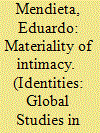

|
|
|
|
|
| Publication |
2013.
|
| Summary/Abstract |
Ash Amin's Land of Strangers (2012) is analysed in terms of how it contributes to an understanding of the materiality of intimacy by looking at toilets. Toilets are analysed in terms of their 'thingy' character, but also how they are philosophical tools that encrypt a whole raft of social relations and ideologies. This is then related to what is here called Amin's somatic dialogical cosmopolitanism.
|
|
|
|
|
|
|
|
|
|
|
|
|
|
|
|
| 7 |
ID:
081750
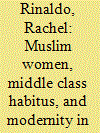

|
|
|
|
|
| Publication |
2008.
|
| Summary/Abstract |
This article asks how pious religious practices, which are often highly gendered, and implicated in diverse formulations of "the modern" in non-Western contexts. Based on ethnographic research among women members of Indonesia's Prosperous Justice Party (PKS), I argue that PKS women's pious practices are part of the creation of a particular kind of middle class subjectivity. An examination of two constitutive elements of this habitus, clothing and marriage, reveals how these pious Islamic practices enact class and gender difference, and simultaneously produce "modern" selves. While scholars have shown that gender is an important axis for class difference, I extend this argument to suggest that gendered forms of piety are key ways class in which distinctions are embodied and expressed. Yet the habitus of PKS women is just one of several competing Islamic habitus in Indonesia. The question of which habitus is most culturally legitimate, I maintain, turns on the hegemony of particular understandings of piety and ideas about how modernity should be defined-issues which remain unresolved in contemporary Indonesia.
|
|
|
|
|
|
|
|
|
|
|
|
|
|
|
|
| 8 |
ID:
168987
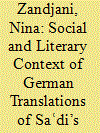

|
|
|
|
|
| Summary/Abstract |
Saʿdi’s Golestān has been translated into German numerous times since the seventeenth century. The purpose of this article is to examine the social and literary context of three German translations and translators: Karl Heinrich Graf, a theologian and researcher of the Old Testament, published his translation of the Golestān in 1846 during German Romanticism; Dieter Bellmann, a professor of Oriental studies, published a revision of Graf’s Rosengarten in 1982 in the German Democratic Republic, where literature was strictly regulated; Kathleen Göpel published her indirect translation from English, prepared by the Afghan translator Omar Ali-Shah, in 1997, at a time of intercultural literature, also called “bridge literature.” Through examples the article shows how the context may have influenced their translations and how the text has changed when traveling across linguistic and cultural borders.
|
|
|
|
|
|
|
|
|
|
|
|
|
|
|
|
| 9 |
ID:
186852


|
|
|
|
|
| Summary/Abstract |
This study explores the experience of elderly rural Buddhist and Taoist believers in communist China where the ruling party has maintained decades-long regulatory control over religion. Based on ethnographic observation and oral histories, the analysis begins with how the actors made sense of and coped in their relationship with the state during the fieldwork period (May–June 2020) when state regulations restricted public religious practice because of COVID-19. The analysis then looks back on how practitioners experienced tightening state ideological control from the early 2010s to before COVID-19; further back at the religious revival during the opening and reform (1980s–2010s); and finally, the Cultural Revolution period (1960s–70s) when strict atheistic measures were imposed. Their narratives reveal the practical logic (habitus) which practitioners used to mediate their resistance against and compromise with the authoritarian state. Specifically, four logical modes that involve actors’ different time–space tactics were identified, namely state–religion disengagement, state–religion enhancement, religious (dis)enlightenment, and karma. The implications of these ostensibly conflicting modes of thinking in mediating the actors’ resistance–compliance interface in contemporary China are discussed.
|
|
|
|
|
|
|
|
|
|
|
|
|
|
|
|
| 10 |
ID:
157497
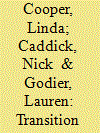

|
|
|
|
|
| Summary/Abstract |
In this article, we employ the theoretical framework and concepts of Pierre Bourdieu to examine the notion of “transition” from military to civilian life for U.K. Armed Forces personnel. We put Bourdieu’s concepts of habitus, capital, and field to work in highlighting key differences between military and civilian life. The use of social theory allows us to describe the cultural legacy of military life and how this may influence the posttransition course of veterans’ lives. There may be positive and negative transition outcomes for service personnel when moving into civilian life, and by applying Bourdieu’s theoretical concepts, we explain how such outcomes can be understood. We suggest that the “rules” are different in military environments compared to civilian ones and that service personnel must navigate a complex cultural transition when moving between environments. There are numerous and significant implications—including policy applications—from understanding transition through a Bourdieusian lens, and these are highlighted throughout.
|
|
|
|
|
|
|
|
|
|
|
|
|
|
|
|
| 11 |
ID:
155074
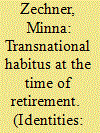

|
|
|
|
|
| Summary/Abstract |
International mobility requires the shifting of bodies across places, through life courses and stages, creating individual and collective experiences that become taken for granted. They are habitus, which is the durable deployment of an individual’s body in the world, as well as a scheme of perception, thought and action that is present throughout life, including retirement. This study asks what kind of transnational habitus is visible in the narratives of interviewed older adults at the time of retirement. The answer is sought by analysing life stories of mobility from older adults who live or have lived abroad for several years. The multilocal transnational habitus of interviewees rests on their desire to maintain their mobility when retired. However, both their physical and mental international mobility are at risk when faced with an ailing body and mind, and policies allow and restrict the transferability of benefits and accessibility to services.
|
|
|
|
|
|
|
|
|
|
|
|
|
|
|
|
| 12 |
ID:
164302
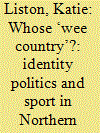

|
|
|
|
|
| Summary/Abstract |
This article responds to calls in this journal for increased attention to identity, culture, power and sport. It explores, for the first time, the lived realities of identity politics in a divided society, through interviews with 12 self-declared Irish nationalists and republicans that represented Northern Ireland. Important insights are revealed into national eligibility decisions for either Irish team, motivated mainly by ‘shop window’ visibility and being seen as the best of a peer group. Political and sporting nationalisms were not necessarily analogous. A significant original finding is that the lived experiences of being closer to ‘the other’ resulted in an overall reinforcement rather than dissolution of difference. Visual and oral ‘national’ symbols such as flag, and especially anthem, delineated such difference, being symbolic walls of the mind. ‘Our wee country’ was thus a polarised and polarising fantasy shield. The article concludes by reconsidering the role of sport as a lens through which to examine identity and its’ place as part of the ‘problem’ and ‘solution’.
|
|
|
|
|
|
|
|
|
|
|
|
|
|
|
|
| 13 |
ID:
124972
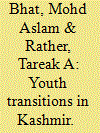

|
|
|
|
|
| Publication |
2013.
|
| Summary/Abstract |
Contemporary interpretations of youth transitions have been extensively influenced by sociological preoccupations with individualisation. Hence youth researchers have been inclined to present homogeneous and synchronised portraits of contemporary youth, skipping the crucial underlying structural features that still persist and sustain differential transitions into adulthood. Drawing on in-depth interviews with young people in Kashmir (North India), this article uses Bourdieu's conceptualisation of interdependent forms of capital to support the proposition that making rational choices and decisions, which does constitute individualisation, also still depends on one's class position.
|
|
|
|
|
|
|
|
|
|
|
|
|
|
|
|
|
|
|
|
|